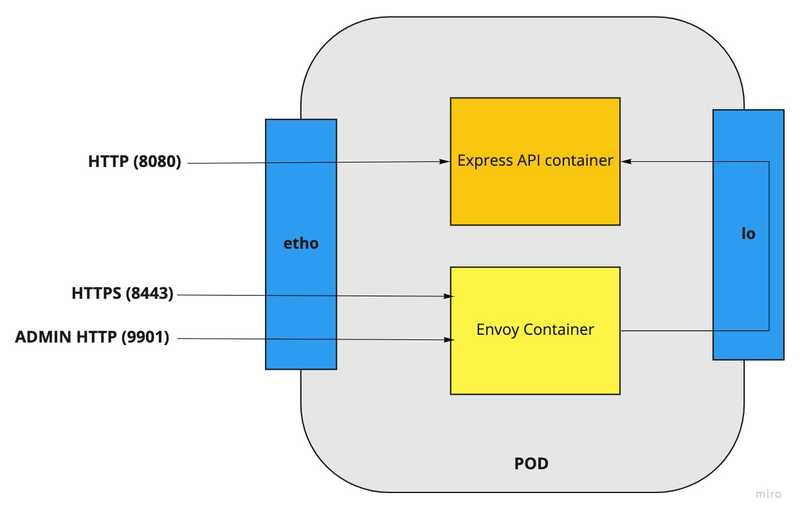Running SSL API with Multi-node local Kubernetes Cluster
Tue Mar 29 20228 min read
The pain of local development with Kubernetes
Personally I love Kubernetes. It has solved so many problems that used to haunt development teams going to production and keep production up and running.
But one major pain point with Kubernetes has always been local development. There is no way to test fully fledged cluster setup and how your application behaves in the distributed environment till you deploy it to an actual cluster.
There are many platforms that offer you Kubernetes clusters to play with. For example: Katacoda, Play with Kubernetes, Minikube etc. Or else you can go with GKE(google), EKS(amazon) etc.
But as far as I found, there are limitations with those options. Either these clusters/environments are temporary(Katacoda, Play with Kubernetes etc) or you get only a single node cluster(Minikube) or you will have to pay for what you consume(GKE, EKS etc).
What if, we can set up a highly available Kuberenetes cluster locally for our development and testing purposes ? Which is permanent and also it doesn’t cost you a single penny. Sounds great ? Furthermore , if the cluster setup process is simple and straight forward?
Introducing KinD
As per the official definition for KinD (Kubernetes in Docker) -
kind is a tool for running local Kubernetes clusters using Docker container “nodes”. kind was primarily designed for testing Kubernetes itself, but may be used for local development or CI.
Installing KinD
There are multiple ways to install KinD, but I prefer to install using Go Modules.
Make sure you have Go(1.17+) and Docker installed
go get sigs.k8s.io/kindThis should add KinD in your PATH.
Creating the Cluster
We will start with a simple cluster, with one Control Pane node and 2 Worker nodes.
Start by creating a config file - kind-config.yaml
You can find the file in the GitHub repo
kind: Cluster
apiVersion: kind.x-k8s.io/v1alpha4
nodes:
- role: control-plane
- role: worker
- role: workerCreating the cluster simple, run the command
kind create cluster --config kind-config.yamlVerify the cluster is running as expected.
kubectl get nodesBuilding the API
We are gonna build a simple Express Server which listens on / and returns back the hostname
const express = require('express')
const os = require('os')
const app = express()
const port = 8080
app.get('/', (req, res) => {
res.send(`You've hit ${os.hostname()} \n`)
})
app.listen(port, () => {
console.log(`Express app listening on port ${port}`)
})Create the Docker file for the API container.
FROM node:16-alpine
WORKDIR /express-app
COPY . .
RUN npm install
EXPOSE 8080
ENTRYPOINT ["node", "app.js"]All code is under the api folder in the GitHub repo
Introducing Envoy Proxy
Envoy is an L7 proxy and communication bus designed for large modern service oriented architectures (from official documentation)
Why use Proxy for SSL
It’s obvious that if you implement TLS support within the Node.js application itself, the application will consume less computing resources and have lower latency because no additional network hop is required, but adding the Envoy proxy could be a faster and easier solution.
It also provides a good starting point from which you can add many other features provided by Envoy that you would probably never implement in the application code itself.
Refer to the Envoy proxy documentation to learn more.
Proposed Pod Architecture
Express API container will bind on port 8080 on both network interfaces (eth0 and loopback)
The Envoy proxy handles https on port 8443. It will also expose an admin interface on port 9901.
The Envoy proxy sends HTTPrequests to Express API through the pod’s loopback address.
Setting up Envoy container
The files for Envoy container are available under ssl folder in the GitHub repo
We start by generating self-signed certificates for SSL. For the demo purpose we will create certificates for example.com.
Next we have to create a config file for Envoy. We will name this as envoy.yaml.
Start by defining the admin port
admin:
access_log_path: /tmp/envoy.admin.log
address:
socket_address:
protocol: TCP
address: 0.0.0.0
port_value: 9901Next we define the source for api
clusters:
- name: service_express_localhost
connect_timeout: 0.25s
type: STATIC
load_assignment:
cluster_name: service_express_localhost
endpoints:
- lb_endpoints:
- endpoint:
address:
socket_address:
address: 127.0.0.1
port_value: 8080Finally, define the listeners for binding the https port
Final yaml looks like this
admin:
access_log_path: /tmp/envoy.admin.log
address:
socket_address:
protocol: TCP
address: 0.0.0.0
port_value: 9901
static_resources:
listeners:
- name: listener_0
address:
socket_address:
address: 0.0.0.0
port_value: 8443
filter_chains:
- transport_socket:
name: envoy.transport_sockets.tls
typed_config:
"@type": type.googleapis.com/envoy.extensions.transport_sockets.tls.v3.DownstreamTlsContext
common_tls_context:
tls_certificates:
- certificate_chain:
filename: "/etc/certs/example-com.crt"
private_key:
filename: "/etc/certs/example-com.key"
filters:
- name: envoy.filters.network.http_connection_manager
typed_config:
"@type": type.googleapis.com/envoy.config.filter.network.http_connection_manager.v2.HttpConnectionManager
stat_prefix: ingress_http
route_config:
name: local_route
virtual_hosts:
- name: local_service
domains: ["*"]
routes:
- match:
prefix: "/"
route:
cluster: service_express_localhost
http_filters:
- name: envoy.filters.http.router
clusters:
- name: service_express_localhost
connect_timeout: 0.25s
type: STATIC
load_assignment:
cluster_name: service_express_localhost
endpoints:
- lb_endpoints:
- endpoint:
address:
socket_address:
address: 127.0.0.1
port_value: 8080Finally, we define the DockerFile for the container
FROM envoyproxy/envoy:v1.14.1
COPY envoy.yaml /etc/envoy/envoy.yaml
COPY example-com.crt /etc/certs/example-com.crt
COPY example-com.key /etc/certs/example-com.keyPreparing Container Images
Now we have done our setup, next step is to build and push the images.
makeThe makefile should take care of building and pushing the images.
To make sure the containers are working as expected, try running the containers
Express API container
docker run --rm -p 8080:8080 deboroy/simple-express-apiThis should start the container. To verify it is working, try curling the url.
curl -s http://localhost:8080/You should see something similar to this
You've hit c1872db22f92This means the Express API container is working perfectly.
Envoy Proxy Container
Now we can start the Envoy container, but at present it will throw an error as the loopback is not bound to the API container.
docker run --rm -p 8443:8443 deboroy/envoy-ssl-proxyNow if we curl the https url, we should see an error.
curl -s https://localhost:8443 --insecureError will look something like this -
upstream connect error or disconnect/reset before headers. reset reason: connection failure%This means that proxy container is running and listening on port 8443 but it is not able to connect to the source. Let’s fix this by deploying our pod.
Deploying Containers on Pods
Now lets create a pod description as per our agreed design. Let’s name the file as pod.express-ssl.yaml.
apiVersion: v1
kind: Pod
metadata:
name: express-ssl
spec:
containers:
- name: express-api
image: deboroy/simple-express-api
ports:
- name: http
containerPort: 8080
- name: envoy
image: deboroy/envoy-ssl-proxy
ports:
- name: https
containerPort: 8443
- name: admin
containerPort: 9901The description is pretty straight forward. We are running the Express Container in our pod, with the Envoy Proxy as the sidecar.
Verify that the KinD Cluster is up and running
kubectl cluster-info --context kind-kindNext, create the pod
kubectl apply -f pod.express-ssl.yamlVerify the pod is created
kubectl get po -wNAME READY STATUS RESTARTS AGE
express-ssl 0/2 ContainerCreating 0 5s
express-ssl 2/2 Running 0 22skubectl describe po express-sslYou should see that the containers are started in the events
Events:
Type Reason Age From Message
---- ------ ---- ---- -------
Normal Scheduled 35s default-scheduler Successfully assigned default/express-ssl to kind-worker2
Normal Pulling 35s kubelet Pulling image "deboroy/simple-express-api"
Normal Pulled 26s kubelet Successfully pulled image "deboroy/simple-express-api" in 9.1613133s
Normal Created 25s kubelet Created container express-api
Normal Started 25s kubelet Started container express-api
Normal Pulling 25s kubelet Pulling image "deboroy/envoy-ssl-proxy"
Normal Pulled 14s kubelet Successfully pulled image "deboroy/envoy-ssl-proxy" in 11.1944752s
Normal Created 13s kubelet Created container envoy
Normal Started 13s kubelet Started container envoyNow, we cannot access the containers directly. Ideally, we will be deploying a load-balancer to test the endpoints. But for our local testing, let’s port-forward to verify.
kubectl port-forward express-ssl 8080 8443 9901Forwarding from 127.0.0.1:8080 -> 8080
Forwarding from [::1]:8080 -> 8080
Forwarding from 127.0.0.1:8443 -> 8443
Forwarding from [::1]:8443 -> 8443
Forwarding from 127.0.0.1:9901 -> 9901
Forwarding from [::1]:9901 -> 9901Now when we try doing curl on HTTPS again
curl -s https://localhost:8443 --insecureWe get a proper response back from the server
You've hit express-sslAwesome !!! This means everything is working as expected.
So with this whole setup we saw how easy it is to setup a multi-node Kubernetes cluster with KinD locally. Next time you can test your deployment locally before pushing it to the actual cluster.
Hope you had fun reading this. Happy Coding !!!

